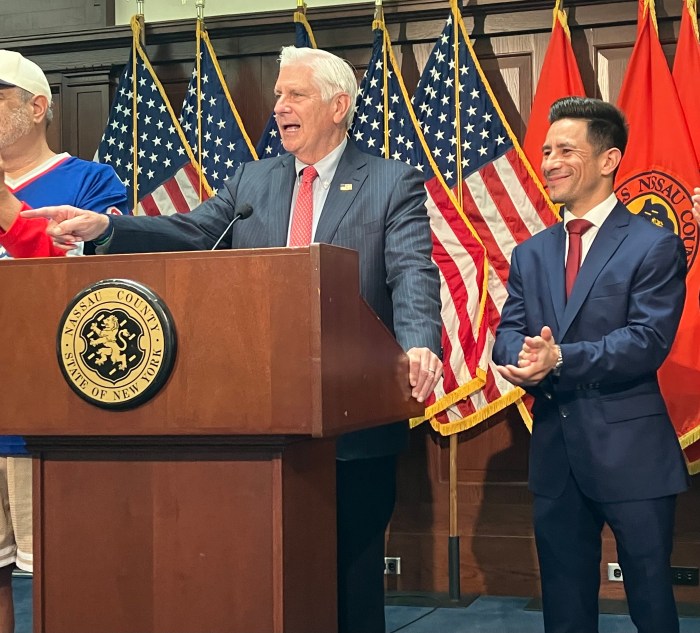The U.S. House of Representatives this week voted overwhelmingly to reign in the National Security Agency’s dragnet collection of Americans’ phone data—a measure that received full support from Long Island’s Congressional delegation.
All five of LI’s Representatives backed the so-called USA Freedom Act, including staunch NSA defender Rep. Peter King (R-Seaford). Joining King was lone local congressional colleague from the same party, Rep. Lee Zeldin (R-Shirley), as well as Rep. Gregory Meeks (D-Queens), Rep. Kathleen Rice (D-Garden City) and Rep. Steve Israel (D-Huntington).
“It was the strongest NSA legislation that can pass the House,” King said in a statement. “Also, as a practical matter, the NSA should still be at least 90 percent as effective under the Freedom Act as it is under current law.”
King has been steadfast in his support of the surveillance agency ever since the disclosures from NSA whistleblower Edward Snowden sparked debate over the program nearly two years ago.
The bill now goes to the U.S. Senate, where it enjoys considerably less support from a group of lawmakers unenthusiastic about stifling the NSA’s surveillance capabilities. Senate Majority Leader Mitch McConnel (R-Kentucky) does not appear eager to coalesce around his Republican colleagues in the House in order to successfully push the bill across the goal line in the Senate.
The bill has the support of several civil liberties groups and the White House. But, the Electronic Frontier Foundation, an advocacy group that supports a free and open Internet, withdrew its support of the bill earlier this month following a momentous US Court of Appeals ruling that determined the NSA’s bulk collection of Americans’ phone data was illegal.
“It is clear that Congress must do more to reign in dragnet surveillance by the NSA,” the EFF said after the ruling. The EFF had originally expressed support for the USA Freedom Act, but even then said the bill lacked critical reforms.
King’s vote may be the biggest surprise. He has been a harsh critic of the journalists—most notably Glenn Greenwald—who reported on the documents leaked by Snowden, even going as far as saying “legal action” should be taken against those who initially reported on the stolen documents.
“No right is absolute and even the press has certain restrictions,” King told Fox News nearly two years ago.
He also didn’t mince words when it came to Snowden, the former NSA contractor.
“I think he’s either a defector or a traitor—I guess take your pick,” King told CNN during the height of the explosive NSA revelations. He added, “I think what he’s done has done incredible damage to our country.”
In a statement to the Press, King said he strongly supports the NSA and “would have voted to reauthorize it without any changes.” Yet, King said he voted in favor of the bill because of its chances of getting through the House without significantly impacting the NSA’s ability to operate unhindered.
Zeldin was more inclined to vote “yes” because of the balance the bill struck between national security and privacy.
“This legislation will significantly scale back the NSA’s data recording program, further protecting our freedoms and civil liberties,” he said in a statement.
Rice, in a statement, called the bill a “common sense” measure that maintains national security “without compromising the privacy of American citizens.”
“Instead of doing nothing and just allowing these programs to expire at a time when we know terrorist organizations are actively working to communicate with people in America and inspire attacks on our soil, we passed a bill that strikes a fair balance, protecting people’s privacy rights while ensuring our intelligence community still has the tools they need to keep us safe,” she said. “That’s why it received such broad bipartisan support in the House and why it deserves the same in the Senate.”
Both Meeks’ and Israel’s offices did not respond to requests for comment.
In its ruling, the U.S. Court of Appeals for the Second Circuit ruled that bulk collection under the NSA’s metadata program is not authorized by Section 215 of the Patriot Act, the controversial post-9/11 anti-terror law that gave intelligence agencies sweeping powers in the name of national security. Mounds of significant information can be gleaned from metadata, including the length of a phone call, phone number of its participants and in some instances, the precise origins of the phone calls. The court ruled that the program exceeded the scope of Congress’ authorization.
The bill also includes reforms to the secretive Foreign Intelligence Surveillance Act (FISA) courts, which civil liberties groups argue has essentially acted as a rubber stamp for intelligence agencies. The bill would create the position of a special privacy advocate that would argue privacy concerns to the court and whose office would be able to appeal disputed decisions.
The Senate must act on the bill in the coming weeks because the provision of the Patriot Act, which authorized the controversial practice, Section 215, sunsets on June 1.
































